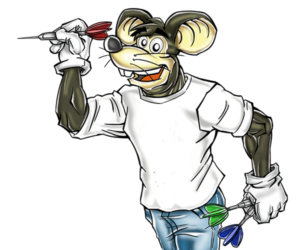Welcome to Placegetters
Do you give your bets the Acid Test? What is the Acid Test?
Well, you might recall from school days the experience of testing a liquid to determine its level of acidity (or Ph level). In the laboratory, this test is done using litmus paper. Placing a blue strip of paper into an acidic liquid would turn the paper red. Conversely, a red strip placed into an alkaline solution would turn blue. Hence, the Acid Test refers to determining the value or success of something.
When we ask “Have you given your bets the Acid Test?” we mean “Have your bets been subjected to a stringent test and analysis, to determine if they have any real potency?”
In punting terms, of course, this assumes that some form of record has been kept over a reasonable period. Without this, it is impossible to determine accurately whether a punter is winning or losing in the long term. In the opinion of almost every horse racing pundit of any credibility, it would also be impossible to win in the long term without having some form of record to which you can periodically refer.
We’re all familiar with the punter who enthusiastically recounts to us their tales of stunning successes, but unless these people can show a solid record of their bets over time, we can safely assume that they are, in fact, one of the 98+% of punters who lose consistently. Anyone can score a big win, even a big Exotic win, simply by taking out “Mystery Bets” at the local TAB or bookmaker, so such boasts count for virtually nothing, especially in the long run. It’s only those who can show a positive result over a lengthy period who should be admired, and perhaps listened to.
So, if we accept the proposition that record-keeping is essential, that still leaves other questions to answer. Obviously, the record needs to be a successful one. How is such a list to be compiled?
Our studies of gambling (which we define as the practice of wagering on something when the outcome cannot be guaranteed), have led us to conclude that the most important factor of all the variables involved is Probability. When we think about it, it becomes clear that the entire Universe runs on Probability (not that we need to be concerned about everything in the Universe, of course). Certainly, major industries like finance, insurance and banking run on probability; actuaries can accurately predict balance sheet outcomes from large masses of data, and statisticians can do the same from smaller amounts, thanks to sophisticated testing methods which have been developed.
Horse racing has many variables to consider. Over the last 200 years some of these have, just like cream, ‘risen to the top’ of the list of things to be considered when assessing the likely winner of a horse race. Such things as class, weight, course and distance familiarity, fitness, barrier position, jockey and trainer skill are just some of the most frequently examined, but there are many others. We’ll return to this concept of Probability, and why we think it is the most important, later.

The horses which win the largest percentage of races are of course, the favourites. However, these only pay an average of just under $3 per win, and they only win about 31% of the time. This means that simply backing each favourite will result in a steady loss of about $7 for every $100 invested. (($3 x 31= $93)-$100) = $-7 is the calculation. These selections therefore have a Probability of long-term loss of 1, which is the score given to something which is an absolute certainty (such as the inevitability we will die one day). Everything else in gambling has a Probability which is expressed as a fraction or a decimal of a number less than 1.
What about the real longshots (those over $30)? An analysis conducted showed that of just over 1,000 horses with a starting price of $35 or more (during a 3-month period), only 1.2% won their races. Since the price of a horse is supposed to represent its probability of winning, these should have won about 35/100, or 3.5% of these events. Why didn’t they? In fact, their success rate was less than 1/3 of that anticipated, which is remarkably similar to that of favourites.
Obviously, the bookmakers always try to offer a price which is lower than the horse’s real chance of winning a race (as assessed by them and the handicapper), so that whichever one wins, there is something left over for profit, after everyone has been paid out. They do this by making their assessed probabilities for all the horses in the race (represented by their prices) total more than 100%, or 1, in Probability terms.
For the Tote, the process is even simpler: they just take out about 20% of all the stakes before letting the computers calculate the prices of each animal. Thus, for every dollar invested by the punters, the winners will only receive what they would have won if they’d bet only 80 cents. On top of that, when the Tote calculates a price to be an odd figure, say $3.78, that will always be rounded down to the next lowest zero, in this case $3.70. By this means, sometimes a punter can be betting into a Tote market where the real probabilities total as high as 150-160%! It should go without saying that betting into such markets over the long term gives the punter virtually no chance of coming out ahead, no matter how astute they may be, for how many punters can guarantee that they can get a profit on turnover greater than 50-60%?
If these are the hurdles to be overcome when wagering, how much more important is it to be able to come up with selections which can show a profit over time? The only answer to this problem is to find selections which sometimes (as often as possible) pay more than the horses’ real chance of winning. These are known as ‘overlays’. So it becomes necessary to:
a) Find someone to wager against who doesn’t have as big an advantage as the bookies or the Totes, and
b) Compile a list of selections which, while it could include some favourites (they do win 31% of races), would also contain a fair sprinkling of prices running into the teens, or even 20s and occasionally higher still.
Only by these means can we have a chance of maintaining a profitable situation, regardless of the inevitable losing streaks which every punter must continually endure.
Let’s return to our consideration of making selections, and which form factors to focus upon. More than 200 years of thoroughbred racing has shown which of these, some of which are listed above, are the most effective. The problem is that by following these too persistently, we find ourselves in the company of myriads of other punters, and end up looking too often at the favourites or near-favourites.
How often, when you look at the prices of winners in race meetings, do you see many which are between $5-10, some which are $10-20, and only a smattering of others which finished at higher odds? Clearly, these higher priced horses must have had a chance of winning the race, but somehow most of the punters missed them. When we look more closely at their form guide information, we find that they may not have had as many of the boxes ticked as the highly-favoured entrants, but they had enough things going for them in combination to provide a winning opportunity for some punters.
What is the missing ingredient in the assessment of these runners?
At PlaceGetters, we believe that this all-important factor is Probability. Some may define this as the Luck Factor. Consider that in every race (most races have an average of about 10 runners), there are literally thousands of things happening, even in a short sprint of 1,000 metres. There will be jockey errors, horses getting spooked by unpredictable moves by other horses, perhaps uneven footholds left due to a misstep by a horse in a previous race, horses which may be feeling slightly unwell, but not enough to be detected by a vet examination, and so on. There will be literally tens of thousands of hoofprints pounding into the turf, any one of which could inadvertently strike another horse, or throw a clod of earth right into a following favourite’s nostril or jockey’s mouth. The number of things that can go wrong for a favoured horse is very large indeed, and these things can and do work in favour of less-fancied runners, which nevertheless have a chance, if the Luck evens out over time.

When we punt on a race, we must remember that we are gambling, that it’s impossible to force a desired outcome from so many random factors, and that there is no such thing as a certainty. This is why our selections must include horses that have some chance, but are not favourites, or often not even close to favouritism.
Probability pervades every aspect of life, and our correct assessment of it has a close correlation to our degree of success in many undertakings, not just gambling. We assess Probability when crossing a road, when working at our jobs or businesses, when deciding whether to eat a seafood roll that has been sitting in a shop counter at the end of a very hot day (what are the chances that it will cause gastro?), even when we decide whether to ask an attractive prospect for a date. The list is endless, and most of the time we do it unconsciously, once we have learnt of some of the hazards we can encounter in life.
However, when we are gambling, it must be done consciously, and as accurately as possible. There are some articles in our blog section about assessing Probability, which we hope will be of interest and assistance. It is our belief (supported by evidence) that failure to correctly assess Probability is the major reason behind the failure of most punters to win money in the long term.
Our selections, made using this process and other factors over a period, have shown good profits. We invite you to try them out, and hope that you will find it a profitable venture, as it has been for us.
If you would like to see the FREE selections each Wednesday and Saturday, just visit the website around 9:30am (AEST) or join the mailing list to have the FREE selections emailed to you each race day, or subscribe now to receive ALL of our selections by email.
Stay on target with PlaceGetters – take the gamble out of horse racing!




